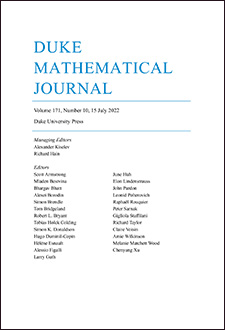Abstract
We prove a nonlinear variant of the general Brascamp–Lieb inequality. Our proof consists of running an efficient, or “tight,” induction-on-scales argument, which uses the existence of Gaussian near-extremizers to the underlying linear Brascamp–Lieb inequality (Lieb’s theorem) in a fundamental way. A key ingredient is an effective version of Lieb’s theorem, which we establish via a careful analysis of near-minimizers of weighted sums of exponential functions. Instances of this inequality are quite prevalent in mathematics, and we illustrate this with some applications in harmonic analysis.
Citation
Jonathan Bennett. Neal Bez. Stefan Buschenhenke. Michael G. Cowling. Taryn C. Flock. "On the nonlinear Brascamp–Lieb inequality." Duke Math. J. 169 (17) 3291 - 3338, 15 November 2020. https://doi.org/10.1215/00127094-2020-0027
Information





